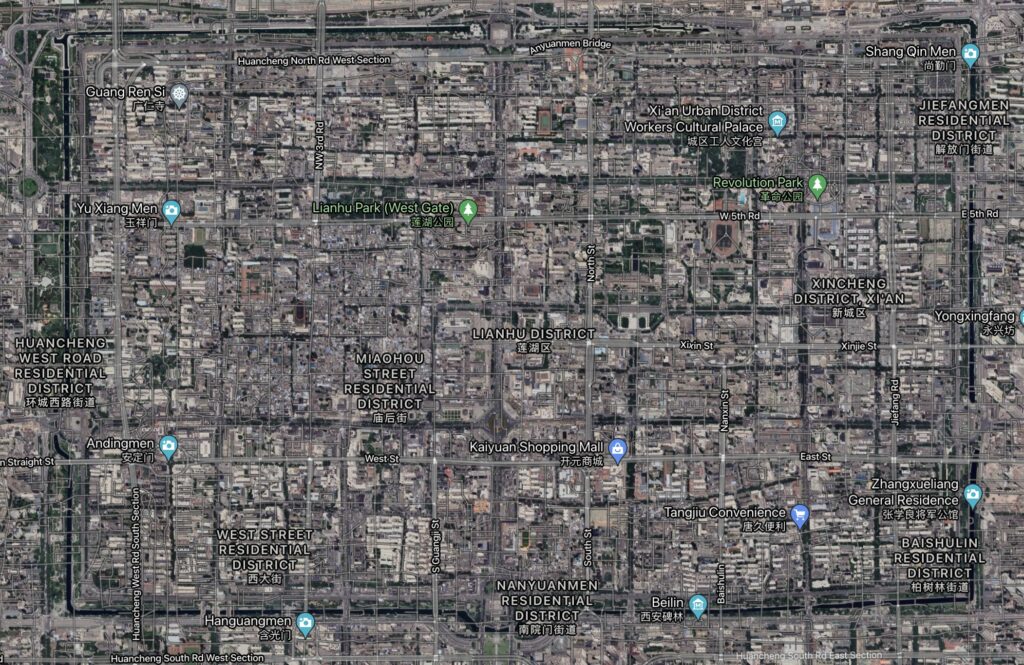迷迷糊糊的,突然觉得有一些记忆开始重合。小时候经常沿着济南的护城河走,方方正正的,绕着老城区一整圈。后面去西安,也喜欢沿着西安的城墙走,方方正正的,也是一整圈。
我有记忆的城市里面,只有济南、西安和北京的道路都是东西南北方向这样。成长在这样的方正的城市里面,自然而然习惯了四向导航,而不是只有左右。
刚看了一下地图,其实济南的护城河和西安的城墙挺像,也难怪突然发觉遥远的记忆里面有两个点悄然重合。北京的城墙都拆了,没见到过了。


、
下面是抄过来的...来自:BerkeleyX: ColWri2.2x Principles of Written English。读完觉得我的英文写作真的是没受过正规教育...哎。
-------------------
There are two main sources of error in diction:
1. Choosing the wrong word. This can happen because of confusion between homonyms (words that sound alike but are spelled differently), or because the meaning of the word isn't fully understood.
2. Choosing colloquial, or less formal spoken language when standard or more formal language is called for (or vice versa). In academic writing, formal diction is generally expected.
Here are 21 common errors made in writing formal diction. How many of these usage errors have you made?
1. A lot/lots of
Colloquial: Diana likes her apartment a lot.
Formal: Diana likes her apartment very much.
Colloquial: There are lots of books in our library.
Formal: There are many books in our library.
2. Among/between
(Tip: Among involves more than two; between involves only two)
Colloquial: Discussions between our group members were often very lively.
Discussions Formal: Discussions among our group members were often very lively.
3. Around/ about
(Tip: Don't use around to indicate time, distance, or other quantity.)
Colloquial: The class usually begins around nine.
Formal: The class usually begins at about nine.
4. Badly
(Tip: "Badly" is not a substitute for "very much.")
Colloquial: The team wanted to win really badly.
Formal: The team wanted desperately to win.
5. Based off of
Colloquial: Based off of that information, we can move ahead with the plan.
Formal: Based on that information, we can move ahead with the plan.
6. Because
(Tip: Don't use "because" after " reason.")
Colloquial: The reason for our flight delay is because of bad weather.
Formal: The reason for our flight delay is the bad weather.
7. A bunch/bunches
(Tip: Use bunch or bunches only for things that are bound or grow together, like bananas and grapes; it is not used for other countable nouns.)
Colloquial: A bunch of us are going to the movies tonight.
Formal: A group of us are going to the movies tonight.
Formal: There are three bunches of bananas on the counter.
8. Each other/one other
(Tip: Each other refers to two, one another refers to more than two.)
Colloquial: Everyone at the party wished each other a happy new year.
Formal: Everyone at the party wished one another a happy new year.
Formal: My sister and I wished each other a happy new year.
9. Guys
Colloquial: I hope you guys can join me at the restaurant.
Formal: I hope all of you can join me at the restaurant.
10. In / Into
(Tip: "In" means "within" or "inside", while "into" refers to the motion of going from outside to inside.)
Colloquial: Bill went in the bus station to buy a ticket.
Formal: Bill went into the bus station to buy a ticket.
11. Infer/imply
(Tip: To infer is an act of thinking, to imply is an act of saying something.)
Incorrect: I saw your memo about a noon meeting. Are you inferring that we should have lunch together?
Correct: I saw your memo about a noon meeting. Are you implying that we should have lunch together?
12. It's/its
Incorrect: The committee has reached it's goals this year.
Correct: The committee has reached its goals this year.
13. Kind of / sort of
(Tip: Don't use "kind of" or "sort of" when you mean "very" , "rather," or "somewhat." )
Colloquial: Jim was sort of angry when he learned we went to the park without him.
Formal: Jim was somewhat upset when he learned we went to the park without him.
14. Less than/fewer than
(Tip: Use less than only with uncountable nouns.)
Colloquial: There are less people in the store today than yesterday.
Formal: There are fewer people in the store today than yesterday.
15. Like / as
(Tip: Use "as" when comparing actions, "like" when comparing things.)
Colloquial: Alan wants to write a new essay, just like Sarah does.
Formal: Alan wants to write a new essay just as Sarah does.
16. Like / maybe
(Tip: Avoid using "like" and "maybe" when estimating; use "approximately", "perhaps" or "about" instead.)
Colloquial: There were like thirty people at my birthday party.
Formal: There were approximately thirty people at my birthday party.
17. Meantime
Colloquial: Meantime, the rain continued to pour.
Formal: In the meantime, the rain continued to pour.
Formal: Meanwhile, the rain continued to pour.
18. On account of
Colloquial: On the account of the weather, our plane was late.
Formal: Because of the weather, our plane was late.
19. Plenty
Colloquial: It has been plenty warm all week.
Formal: It has been very warm all week.
20. So
(Tip: Don't use "so" as a synonym for "therefore".)
Colloquial: Dmitry knew that I missed class, so he shared his notes.
Formal: Dmitry knew that I missed class; therefore, he shared his notes.
Colloquial: This week's homework is so difficult.
Formal: This week's homework is very difficult.
21. They're/their/there
Incorrect: Do you know if their going to the party?
Correct: Do you know if they're going to the party?
Incorrect: What is there address?
Correct: What is their address?